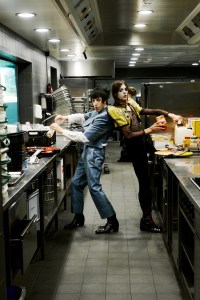
Lucio Corsi
Francis Delacroix/Billboard Italy
For the Italian public, he is now an artist who needs no introduction. His surprising climb to second place at the Sanremo Festival 2025 with the song “Volevo Essere un Duro” (“I Wanted to Be a Tough Guy”) made him famous thanks to its mix of tenderness, irony and aesthetic and musical references to glam rock – reinterpreted in his own way. However, for the international public of Eurovision 2025, Lucio Corsi is an artist who is still to be discovered.
Italy’s presence among the “Big Five” guarantees him direct access to the final, but will he be able to replicate his unexpected success of Sanremo? He openly does not aim for victory: “Music for me is not a competition. It would make no sense: how can you compete in music? It’s not a sport,” he says, sounding sincere.
However, everyone’s eyes and ears are focused on the Saturday (May 17) final, where the 2025 Eurovision Song Contest winner will be decided. Billboard Italy interviewed the “anti-hero” songwriter after his performance in the first semifinal to gather his thoughts and impressions before the final.
What was your first impression of Eurovision?
It was interesting to see how many rehearsals there are before the performance. They are repeated several times a day and there is great attention to every little detail. There is also great readiness to improve the shots and the sound. It is a fortune to be able to invent what we want on stage.
What are the similarities and differences between Sanremo and Eurovision?
In Sanremo everything is very concentrated: from morning to evening there are interviews, rehearsals, performances. Here, instead, everything is more dilated in time and there are fewer things on your schedule. In Sanremo you continuously breathe the atmosphere of the festival, here you can also isolate yourself: in some moments you don’t even feel like you are at Eurovision. It is also interesting to be able to encounter other types of musical expression, from other countries and with other conceptions of the songs.
You said that you particularly like Napa, the Portuguese band. Have you had the chance to meet other Eurovision artists in person?
Yes, I met Go-Jo, the Australian artist. I first met him by chance while walking in Rome: we turned a corner and found ourselves face to face. It’s a small world…. Then I met [Estonian artist] Tommy Cash here in the hotel. These encounters are among the nice things of these experiences.
After your performance, many people appreciated your reference to a glam rock sound and aesthetic. Is it an element you are counting on to appeal to an international audience?
I have always tried to find my own way of being inspired by that type of sound. I have always liked it, since adolescence. It is not something aimed at making an impression: it just interests me on the level of composition, sound, research. However, I like many types of music, from folk to prog rock. In the future, I would like to delve into other things as well. This is just a snapshot of this period of mine.
How was your “anti-hero” style received by those who didn’t know you before?
I’m very happy that the English subtitles to the lyrics did their job. I’m happy to see that foreign journalists understood the meaning of the song. I hope that can happen in the final, too. The English translation we did is the simplest possible, because it has to reach non-native speakers as well. We didn’t need a sophisticated translation but a clear, immediate text.
Your collaboration with Tommaso Ottomano, who is with you on stage, is very close: tell us about the human and professional relationship that binds you guys.
He’s like a brother. We’ve known each other since we were kids and we’ve invented everything together, from songs to music videos [Ottomano is also a director, ed.]. We both come from Tuscan, in particular from Maremma, which is a sort of Italian Wild West. Music took us away from the boredom of the province, which is also wonderful because it’s very similar to peace. Learning to deal with such boredom as kids gave us the opportunity to find escapes in music. Also, the stories of people from the provinces are very epic: since the places are “small,” these stories have to be in some way gigantic. This inspires me a lot.

Lucio Corsi
Francis Delacroix/Billboard Italy